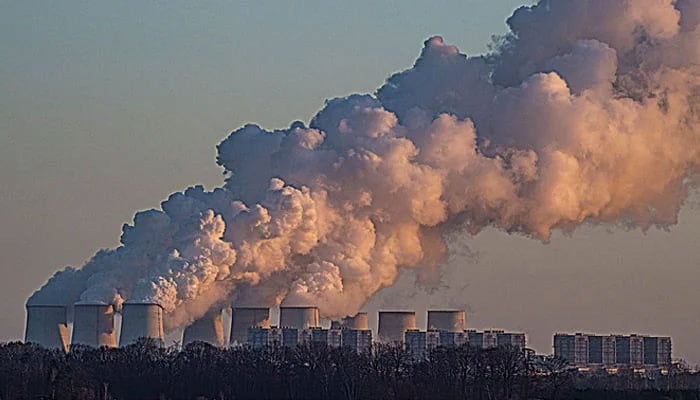The climate threat
Pakistan made formal request for around $1 billion in funding from IMF under trust, to address its vulnerability to climate change
The 2020s will forever be remembered as the decade where the threats of climate change, which used to be limited to textbooks and scientific papers, became a reality. Developed countries also struggle to deal with the disastrous effects of apocalyptic floods and extreme heatwaves. Pakistan had its own nightmarish episode in 2022 when flash floods left two-thirds of the country underwater, prompting policymakers to make a strong case for climate aid. Such demands are justified. Pakistan is among the most affected countries by climate change while its contribution to global gas emissions is around 1.0 per cent. It can be easily implied that climate disasters are the doing of the rich world. Last year, when countries at the COP29 summit in Baku adopted a $300 billion a year global finance target to help poorer nations cope with the impacts of climate change, Pakistan was among the voices that criticised the deal as ‘woefully insufficient’. This diplomacy is commendable, but the country also has to shift its focus on what it should be doing to avert climate change -- or at least minimise its impact. At the moment, it is focused on securing climate aid. Pakistan made a formal request in October last year for around $1 billion in funding from the IMF under the trust, to address its vulnerability to climate change.
That developing countries need some aid to fight against climate change is an unfortunate fact. But countries like ours that are already under the chokehold of IMF conditions should realise that no country or institution is interested in doling out handouts. Such aids are often wrapped under layers of conditions that paralyse governments and prevent them from making pro-people decisions. Rich nations and financial institutions should also realise that the developing world cannot be run corporate-style where the bottom line triumphs over everything else. The threat of climate change is real: according to the UN agency World Meteorological Organisation (WMO), climate-related disasters have caused economic losses exceeding $4.3 trillion and claimed the lives of over two million people globally between 1970 and 2021. A separate UN study predicts that Karachi and Dhaka will be the only two Asia-Pacific cities among ten globally to experience a huge influx of climate migrants by 2050 if global temperatures rise more than 1.5 C above pre-industrial levels. Dhaka is expected to receive 3.07 million additional people, and Karachi 2.4 million. The burden on the already overcrowded metropolises would pose more challenges for the governments of the two countries.
Pakistan now has to pledge to come up with local solutions to fight against this threat. No wealthy nation or financial institution is stopping us from clearing storm drains and fixing roads to ensure the free flow of rainwater. No wealthy nation is preventing us from not allowing construction in national parks or on fertile land -- converting the country into a concrete jungle. Instead of focusing on external help, it is time we thought of innovative solutions to address our challenges. The adoption of old traditional ways of using ‘khus’ curtains, focusing on establishing urban forests in residential areas, and protecting forest cover. Our past experiences tell us that when a disaster strikes, we are usually left on our own.
-
 Hailee Steinfeld Spills Her 'no-phone' Rule With Husband Josh Allen
Hailee Steinfeld Spills Her 'no-phone' Rule With Husband Josh Allen -
 Bowen Yang Gets Honest About Post SNL Life: 'It’s An Adjustment'
Bowen Yang Gets Honest About Post SNL Life: 'It’s An Adjustment' -
 Charlize Theron Delivers Strong Message At 2026 Winter Olympics Opening Ceremony
Charlize Theron Delivers Strong Message At 2026 Winter Olympics Opening Ceremony -
 Lil Jon Reacts To Son Nathan Smith's Death: 'Devastated'
Lil Jon Reacts To Son Nathan Smith's Death: 'Devastated' -
 Bianca Censori Reveals Where She And Kanye West Stand On Having Children Together
Bianca Censori Reveals Where She And Kanye West Stand On Having Children Together -
 Taylor Swift Hypes Olympic Athletes In Surprise Video Message
Taylor Swift Hypes Olympic Athletes In Surprise Video Message -
 Timothy Busfield Charged With Four Counts Of Child Sexual Abuse
Timothy Busfield Charged With Four Counts Of Child Sexual Abuse -
 Amy Schumer Explains Why Her Sudden Photo Surge Is ‘not A Cry For Help’
Amy Schumer Explains Why Her Sudden Photo Surge Is ‘not A Cry For Help’ -
 Kanye West First Contacted Bianca Censori While In Marriage To Kim Kardashian?
Kanye West First Contacted Bianca Censori While In Marriage To Kim Kardashian? -
 Travis Kelce Reveals What His Nieces Really Do When He, Taylor Swift Visit
Travis Kelce Reveals What His Nieces Really Do When He, Taylor Swift Visit -
 Lola Young Makes Career Announcement After Stepping Back From Touring
Lola Young Makes Career Announcement After Stepping Back From Touring -
 Priyanka Chopra Shares Heartfelt Message For Nick Jonas
Priyanka Chopra Shares Heartfelt Message For Nick Jonas -
 Spotify, Major Labels File $13b Lawsuit Over Alleged Music Scraping
Spotify, Major Labels File $13b Lawsuit Over Alleged Music Scraping -
 Travis Kelce Opens Up About Being Backup Plan For His Nieces
Travis Kelce Opens Up About Being Backup Plan For His Nieces -
 Winter Olympics 2026: Chinese Robot Dance Goes Viral In Milan
Winter Olympics 2026: Chinese Robot Dance Goes Viral In Milan -
 Jessica Biel Urged To Divorce Justin Timberlake?
Jessica Biel Urged To Divorce Justin Timberlake?




